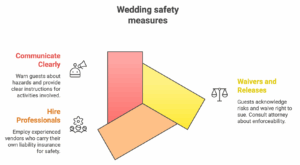Weddings are supposed to be joyous celebrations, but sometimes, things go wrong. An injury at a wedding isn’t just a buzzkill; it can also open the door to potential legal battles centered around liability and negligence. Understanding these risks is crucial for anyone involved in planning or hosting a wedding.
Wedding Injury: Understanding Liability and Negligence
Liability in the context of a wedding means who is legally responsible for injuries that occur. Negligence, at its core, means someone failed to exercise reasonable care, leading to harm. Determining negligence often hinges on demonstrating a “duty of care” owed to the injured party, a breach of that duty, causation (the breach directly caused the injury), and damages (actual harm resulted).
For example, imagine a guest tripping over an unmarked cable. Proving negligence might involve showing the wedding venue or planner had a duty to ensure the area was safe, they failed to do so by not marking the cable, the trip caused the guest to break their arm, and that the broken arm incurred medical expenses and lost wages.
Successful lawsuits often involve clear evidence of negligence. Unsuccessful cases, however, frequently lack this evidence or involve “comparative negligence,” where the injured party is partially responsible for their own injury (more on that later).
1. Slip and Fall Fiascos: Avoiding Negligence on the Dance Floor
Slip and falls are among the most common wedding injuries. Think spilled drinks, uneven flooring, or dimly lit walkways.
- Avoidance: Conduct a thorough venue inspection, paying close attention to potential hazards. Ensure adequate lighting, clearly mark any obstacles (cables, steps), and promptly clean up spills. Encourage guests to be mindful of their surroundings.
2. Booze-Fueled Blunders: When Over-Serving Leads to Injury and Liability
Alcohol plays a big role in many weddings, but excessive drinking can lead to accidents and injuries. Dram shop laws, which vary by state, can hold establishments (and sometimes individuals) liable for injuries caused by intoxicated persons they served.
- Avoidance: Hire professional bartenders trained to recognize signs of intoxication. Offer plenty of non-alcoholic beverages and food. Consider limiting drink tickets or implementing a cash bar to control alcohol consumption. Provide safe transportation options, like shuttle services or designated driver programs.
3. Food Poisoning Catastrophes: Negligence in Wedding Catering and Prevention
Food poisoning can ruin a wedding reception faster than you can say “salmonella.” If guests get sick from contaminated food, the caterer and potentially the wedding hosts could be held liable.
- Avoidance: Choose reputable caterers with a proven track record of food safety. Verify their licenses and insurance. Ensure proper food handling, storage, and temperature controls are in place. Consider posting signs advising guests with allergies to inform the catering staff.
4. Decor Dangers: Mitigating Injury Risks from Decorations and Venue Negligence
Elaborate decorations can create a beautiful atmosphere, but also pose hazards. Loose wires, unstable structures, and flammable materials can lead to injuries. Venue negligence, such as faulty wiring or inadequate fire exits, also contributes to this risk.
- Avoidance: Use professional decorators who are aware of safety regulations. Ensure decorations are securely fastened and don’t obstruct pathways. Check for fire hazards and ensure fire extinguishers are readily available. Confirm the venue’s compliance with safety codes.
5. Transportation Troubles: Liability for Guest Injuries During Wedding Transportation
If you’re providing transportation for guests, you’re also assuming responsibility for their safety during transit. Accidents involving shuttle buses, limousines, or even designated drivers can lead to liability claims.
- Avoidance: Hire reputable transportation companies with licensed and insured drivers. Ensure vehicles are properly maintained and inspected. Clearly communicate transportation schedules and safety guidelines to guests.
6. Protecting Your Big Day: Insurance and Strategies to Minimize Wedding Negligence and Liability
Wedding insurance is essential for protecting against unforeseen events, including injuries. There are generally two types:
- Liability Insurance: Covers bodily injury or property damage claims arising from accidents at the wedding.
- Cancellation/Postponement Insurance: Covers costs associated with rescheduling or canceling the wedding due to unforeseen circumstances (extreme weather, venue closure, etc.). While it doesn’t directly cover injury liability, it can protect your financial investment if an event leading to injury necessitates cancellation.
Beyond insurance, consider these risk mitigation strategies:
- Waivers and Releases: While not always enforceable in all jurisdictions, these documents ask guests to acknowledge potential risks and waive their right to sue for certain injuries. Consult with an attorney to determine their enforceability in your state.
- Hire Professionals: Employ experienced vendors (caterers, bartenders, decorators) who carry their own liability insurance.
- Communicate Clearly: Warn guests about potential hazards and provide clear instructions for activities.

Legal Defenses and Comparative Negligence
Even with precautions, lawsuits can happen. Common legal defenses in wedding injury cases include:
- Assumption of Risk: Arguing the injured party knowingly and voluntarily exposed themselves to a known risk (e.g., dancing on a crowded dance floor).
- Contributory Negligence: In some states, if the injured party contributed at all to their injury, they cannot recover damages.
- Comparative Negligence: More common, this reduces damages based on the injured party’s percentage of fault. For example, if a guest who was intoxicated tripped and fell due to a dimly lit walkway, the court might find the venue 60% responsible for the lighting and the guest 40% responsible for being intoxicated. Damages would be reduced accordingly.
Planning a wedding involves countless details. By proactively addressing potential negligence risks, securing appropriate insurance, and understanding your legal responsibilities, you can help ensure your special day remains a joyous and safe celebration for everyone.






As I web-site possessor I believe the content material here is rattling fantastic , appreciate it for your hard work. You should keep it up forever! Best of luck.